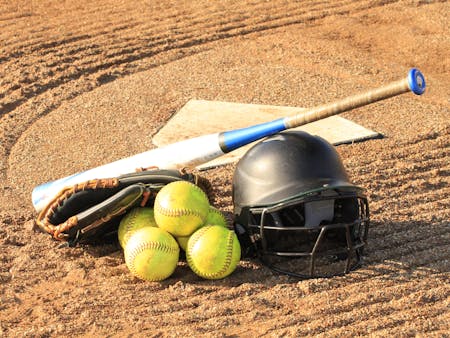Softball’s more than just a pastime; it’s a passion that unites players and fans alike. Whether you’re a seasoned pro or just starting out, there’s always something new to learn about this dynamic sport.
In this article, I’ll dive into the ins and outs of softball, from the basic rules to the strategies that can give your team the upper hand. You’ll discover what makes softball such an exciting and inclusive game for people of all ages.
The Basics of Softball
Softball, often mistakenly written as “soft ball,” is a game deeply rooted in history and skill, and mastering the basics is essential for anyone looking to get involved. The game is played on a field with a diamond-shaped circuit of bases, similar to baseball. Yet, it’s the distinct features like the softer, larger ball and underhand pitching that make it unique.
The Field and Equipment: Softball fields have a pitcher’s mound that’s at a distance of 43 feet from home plate in fastpitch, and the bases are 60 feet apart. Players use a larger, softer ball compared to baseball, and bats specifically designed for softball. Personal gear includes helmets, gloves, and cleats which are pivotal for safety and performance.
Objectives and Scoring: The primary aim in softball is to score more runs than the opponent. Teams accumulate runs by hitting the ball and running the bases to reach home plate. The team with the most runs at the game’s completion is declared the winner.
Playing softball incorporates both offensive and defensive strategies. On offense, players focus on batting skills and base running:
- Hitting: Strive for a powerful and strategic swing to make the ball difficult for the other team to field.
- Base Running: After a hit, players must quickly assess the field and decide whether to run for the next base or stay put.
Defensively, the key is to prevent the batting team from scoring:
- Pitching: This is a central skill in softball, requiring precise control and speed. Pitchers often have a repertoire of pitches they can utilize, from fastballs to changeups.
- Fielding: Quick reflexes and cautious teamwork allow players to catch or stop the ball and make outs.
Gameplay Structure: Softball games are typically seven innings long, each split into a top and bottom half. Teams alternate between batting and fielding, and each team’s entire batting order gets the chance to play before the inning is over.
Understanding these basics sets the groundwork for any player or fan to dive into the nuances that make softball such a beloved sport. Being familiar with the rules and gameplay mechanics is one thing, but it’s the practice and in-game experience that truly polish a player’s skills.
Understanding the Rules
When you’re diving into softball, mastering the rules is just as important as honing your swing. I’ve noticed many players excel by paying close attention to the sport’s regulations, which differ subtly but significantly from baseball.
The Game’s Objective remains consistent with what we know: teams compete to outscore each other during a series of innings. Each inning includes a top half, where the visiting team bats, and a bottom half for the home team.
Key Regulations
In terms of gameplay details, here are the essentials:
- Player Positions: A team must have nine or ten players on the field. The tenth player is the designated hitter, but their use isn’t universal.
- Strikes and Balls: A batter is allotted three strikes before a strikeout is called. Four balls earn a walk to first base.
- Hit Balls: A ball hit outside the first or third-base line is a foul; two strikes can also be earned this way.
- Stealing Bases: Unlike baseball, stealing bases is generally more restricted in softball.
- Runners on Base: Runners must stay in contact with their base until the pitcher releases the ball.
Game Length and Scoring
Most softball games are scheduled for seven innings. If the score is tied, extra innings are played to break the deadlock. Runs are scored much like in baseball: a player must successfully round all bases and cross home plate.
Umpires and Decisions
Games are typically overlooked by one or more umpires, who ensure the rules are followed and make critical calls on plays. It’s their role to call balls, strikes, outs, and safe plays, and they are the final arbiters of any on-field dispute.
In terms of scoring and errors, runs can be earned or given up through strategic play or opposing team mistakes. I’ve witnessed games where a single error tipped the balance, underlining the importance of both mental and physical sharpness.
Understanding these rules takes practice, and watching games can be as informative as playing. The more you immerse yourself in the sport, the more intuitive these aspects become. Keep in mind that local leagues may have small variations in their rulebooks, so it’s worth checking specifics if you’re joining a new competition.
Essential Skills for Softball Players
To excel in softball, certain skills are non-negotiable. Batting technique sits high on this list. I’ve spent countless hours at the batting cage and I can attest to the power of a well-honed swing. It’s not just about strength; batting accuracy and timing are critical. I constantly adjust my stance and swing path to ensure each hit counts.
Another indispensable skill is fielding. Whether it’s catching fly balls or stopping grounders, the ability to play the field effectively can make or break a game. Quick reflexes and a strong arm are the hallmarks of standout infielders and outfielders. Good communication is also key; without it, even the best fielders can falter.
Pitching is an art in itself. Developing a repertoire of pitches—from fastballs to changeups—gives a pitcher the upper hand. I’ve learned that muscle memory and consistency are essential for maintaining control and velocity on the mound. Pitchers are the backbone of a team’s defense and mastering the craft requires dedication and strategic thinking.
Here are some skills that no softball player should be without:
- Strong Throw: A player’s throw is their lifeline, the better the throw, the better the play.
- Speed and Agility: Swift movements are vital, not just for base running but also for defensive plays.
- Mental Toughness: The mind is as important as the body in softball. Keeping cool under pressure is what separates the good from the great.
- Teamwork: Softball is a team sport at its core. Building strong relationships and understanding teammates’ strengths and weaknesses contribute immensely to a successful game plan.
Amidst perfecting these skills, always remember the importance of strategic gameplay—knowing when to steal a base, when to bunt, and how to read the opposing team’s strategy. These critical decisions often influence the outcome of a game just as much as physical skill.
Strategies for Success
Success in softball goes beyond just mastering the basic skills; it also requires clever strategies and a sharp mind. I’ll dive into some of the key tactics that have helped me and countless teammates achieve remarkable results on the diamond.
Game Preparation
Game preparation is crucial. It begins with scouting the opposition, understanding their strengths and weaknesses, and then devising a game plan to exploit them. For example, if a pitcher has a consistent pattern or a batter has a preferred hitting zone, knowing these details can significantly shift the game in your favor.
Offensive Strategies
When it comes to offense, it’s about smart base running and selecting the right moments to execute plays like bunts or steals. Timing is everything, and so is the element of surprise. Here’s what I focus on:
- Recognizing pitch patterns
- Anticipating fielder positions
- Communicating with base coaches for steal signals
Pitching and Defensive Plays
On the defensive end, pitchers must mix up their pitches to keep batters guessing. This not only involves varying pitch types but also altering pitch speeds and locations. As for fielders, positioning and readiness are non-negotiable—they must constantly adjust to the batter’s profile and the game situation.
Mental Game
Finally, maintaining a strong mental game can’t be overstated. Softball often comes down to pressure situations, and the ability to stay calm and focused can make the difference between a win and a loss. This includes:
- Positive self-talk
- Clear communication with teammates
- Quick decision-making under pressure
By integrating these strategies into your gameplay, you’ll be better prepared to handle the fluid and dynamic nature of softball. Remember that flexibility and adaptability are your allies, as no two games are ever the same. Continual learning and applying these techniques will keep you one step ahead of the competition.
The Importance of Teamwork
In softball, individual skills are crucial, but the essence of the sport lies within the collective efforts of the team. I’ve witnessed firsthand that teams with a strong sense of unity often outperform those with standout individual players who lack cohesion. Teamwork is the fuel that allows common people to attain uncommon results.
Firstly, effective teamwork in softball is about understanding and playing to each other’s strengths. Each player has a unique role that complements the other, from the lead-off batter getting on base to the clean-up hitter driving the runs home. Here’s why teamwork isn’t just a part of the game; it’s the game itself:
- Communication is vital, not just in calling plays, but in fostering an environment where players feel supported.
- Trust among team members ensures that each player can depend on one another to perform their roles effectively.
- Collaboration during practice leads to a smoother execution of plays seen in games which can make or break crucial moments.
Strategic plays like the hit-and-run or a sacrifice bunt require precise timing and implicit trust between players. If the runner on base doesn’t trust the batter to make contact, the play falls apart. Additionally, pitchers and catchers must work in tandem to control the game’s pace and keep hitters off balance. It’s this synergy created by the combined efforts of the team that can turn a good team into a great one.
Moreover, the dynamic of team spirit plays a massive role in overcoming adversity. Softball games can swing dramatically, and it’s the resilience and encouragement within a team that often determines whether they can bounce back from a deficit or close games out under pressure. I’ve seen teams rally from behind many times, thanks in large part to a collective belief and mutual support that only a close-knit team can provide.
Defense is another area where teamwork is non-negotiable. Shifting fielders, covering bases, and backing up throws are all sequences that require fluid coordination. A single lapse in teamwork can lead to errors, and in softball, errors can be the difference between winning and losing.
The unity and chemistry built off the field are just as important as the collaboration on the field. Teams that bond through team-building activities and shared experiences bring that sense of camaraderie to the diamond, making them stronger and more cohesive units during competition.
Tips for Choosing the Right Softball Equipment
Just as the heartbeat of softball lies with the team’s synchronized effort, every beat is strengthened by the right equipment. I’ve realized that selecting the best gear is less about the price tag and more about the fit, quality, and appropriateness for your specific role on the team.
Finding the Perfect Glove is critical. In softball, gloves vary by position, so it’s essential to choose one that aligns with your duties on the field. For example, infielders may prefer smaller gloves for quick ball retrieval, while outfielders tend to favor larger pockets to catch fly balls. Breaking in your glove is also a must – it won’t only conform to your hand better but improves your response time during play.
The choice of bats should not be taken lightly either. The weight and length of the bat directly impact your swing speed and control. Here’s a pro tip: swing several bats before making a purchase. It’s the feel during the swing that’ll guide you to the bat that feels like a natural extension of your arm. Remember, Heavy Doesn’t Always Mean Powerful; a bat that’s too heavy can slow you down, impacting your timing and performance.
Don’t overlook the importance of choosing the right Cleats. They’re the foundation of every swift move you make. Cleats come in various styles and materials, designed for traction and agility on different surfaces. Comfort is paramount because you’ll be on your feet for extended periods, so make sure the fit is snug, not tight, to avoid blisters and discomfort.
Lastly, protection gear such as helmets and masks should always meet league standards – safety first is a non-negotiable rule in softball. Ensure that the helmet fits snugly and that the mask offers clear visibility and doesn’t obstruct your breathing. Protective padding should be neither too restrictive nor too loose; you should be able to move freely without sacrificing protection.
By paying attention to these details, you’ll not only optimize your performance but also enjoy the game to its fullest, with confidence that your equipment won’t let you down.
The Benefits of Playing Softball
When I consider the benefits of playing softball, the advantages extend beyond hitting home runs. As a dynamic sport, softball provides a wealth of opportunities for physical and mental enhancements that are valuable both on and off the field.
Physical Fitness: Softball is an excellent source of cardiovascular exercise, improving heart health and stamina. From sprinting bases to fielding balls, the game engages multiple muscle groups, aiding in overall physical conditioning. I’m always amazed at the agility and strength I develop during the season, which are crucial components of a healthy lifestyle.
Mental Resilience: There’s no doubt that softball challenges the mind. Being in high-pressure situations, such as defending a lead or making split-second decisions, sharpens mental acuity. It’s rewarding to see myself becoming more strategic and resilient as I confront and overcome the mental demands of the game.
Social Interaction: The camaraderie on a softball team is unlike any other. Through practice and games, I’ve made lifelong friendships and networked with a diverse group of people. These social interactions help build communication skills and often lead to opportunities beyond the diamond.
Teamwork Skills: On the field, I’ve learned that collaboration is key. Every play relies on the coordination and trust among teammates. These teamwork skills are directly transferable to my professional life, where working well with others is often a recipe for success.
Stress Relief: After a long day, there’s nothing quite like the exhilaration of playing softball. The physical activity helps release endorphins, promoting a sense of well-being and serving as a natural stress-reliever. I find that after a game or practice, I’m more relaxed and ready to tackle my next challenge with renewed energy.
By engaging in softball, I enhance my physical health, mental well-being, and social skills. Moreover, it imparts important life lessons and coping mechanisms that are applicable in various aspects of life. Whether I’m on the field hitting a fastball or in the office delivering a presentation, the benefits I gain from this sport continue to influence my growth and success.
Conclusion
Softball’s impact on physical health, mental sharpness, and social abilities can’t be overstated. I’ve seen firsthand how it fosters teamwork and cultivates resilience, all while providing a fun and engaging way to stay active. It’s clear that this sport offers more than just a chance to hit a homerun—it’s a pathway to a healthier, happier life. Whether you’re looking to build strength, forge friendships, or simply unwind, softball might just be the perfect pitch for you. So grab a glove, step up to the plate, and let the game improve your life one inning at a time.


